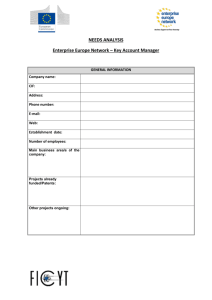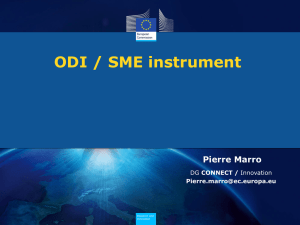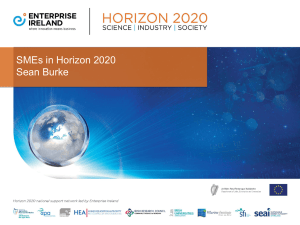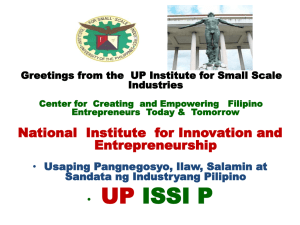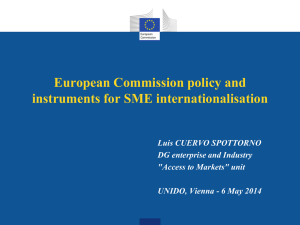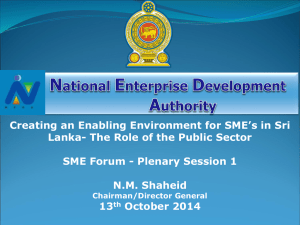SME support: integrated approach
advertisement
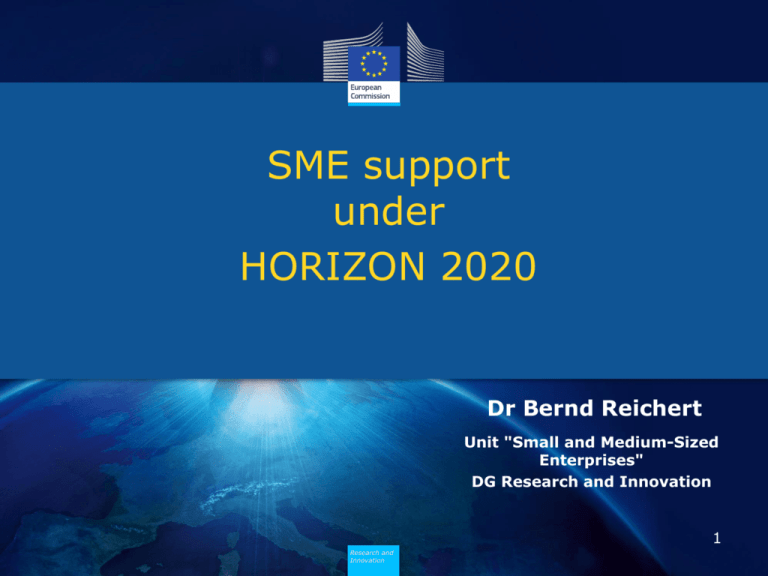
SME support under HORIZON 2020 Dr Bernd Reichert Unit "Small and Medium-Sized Enterprises" DG Research and Innovation 1 Research and Innovation The Analysis Framework 7 SME support under FP7: 16.7% Outcome of impact assessments • Less than 50% of industrial partners use the publicly funded applied research projects strategically • Only about 22% of SMEs participating in EU research programs are strategic innovators • Most academics engage with industry to further their research rather than to commercialise their knowledge • Results are not exploited because projects were not designed for exploitation • There is a strong relationship between internationalisation and innovation, but SMEs are not aware of internationalisation support programmes. • The information environment of (European) R&D programmes is unattractive and repelling to SMEs Funding Gap (range: 1-3 M€) Innovation Union Commitment n°7 Ensure stronger involvement of SME in future EU R&I programmes * European Council 4 February 2011 Commission is invited to explore the feasibility of a Small Business Innovation Research Scheme Concept and Design Horizon 2020 Why participate? • To compete among the best European companies "Champions league" with only very few winners, quality label based on a rigorous assessment • Visibility at European level • Possibility to receive business/management coaching • Networking possibility with investors and customer networks • Preferential treatment for subsequent financing (EU Financial Instruments: loan and equity facilities) 8 Horizon 2020 SME support: integrated approach 20 % budgetary target in LEITs & SC 'Innovation in SMEs' Collaborative projects SME instrument 13% 7% Eurostars II Enhancing Innovation Capacity Market-driven Innovation Access to Risk Finance 9 SME instrument ? Procurement Concept & Feasibility Assessment IDEA Demonstration Market Replication Research Development Commercialisation business coaching and complimentary services SME window EU financial facilities MARKET 10 Phase 3 = 2% budget Phase 1: Concept and feasibility assessment Input: Idea/Concept: "Business Plan 1" (~ 10 pages) 10% budget Activities: Feasibility of concept Risk assessment IP regime Partner search Design study Pilot application etc. 10% success Phase 2: R&D, demonstration, market replication Phase 3: Commercialisation Input: "Business plan 2" plus description of activities under Phase 2 (~ 30 pages) 88% budget Promote instrument as quality label for successful projects Activities: Development, prototyping, testing, piloting, miniaturisation, scaling-up, market replication, research Support via networking , training, information, addressing i.a. IP management, knowledge sharing, dissemination 30-50% success Output: elaborated "Business plan 2" Output: "investorready Business plan 3" Lump sum: 50.000 € 1-3 (5) M€ EC funding ~ 6 months ~ 12 to 24 months Facilitate access to private finance SME window in the EU financial facilities (debt facility and equity facility) Possible connection to PPC (and PPI?) No direct funding Main features • Targeted at all types of innovative SMEs showing a strong ambition to develop, grow and internationalise • Only SMEs will be allowed to apply for funding and support • Single company support possible • No obligation for applicants to sequentially cover all three phases; each phase open to all SMEs • 70% funding (exceptions possible) 12 Implementation Article 18(2) Regulation • […] a dedicated SME instrument that is targeted at all types of SMEs with an innovation potential, in a broad sense, shall be created under a single centralised management system and shall be implemented primarily in a bottom-up manner via a continuously open call […] • Implemented centrally by one agency (EACI) • Bottom-up approach within the frame of the societal challenges and enabling technologies each SC & LEIT defines a broad topic • Continuously open call with around 4 cut-off dates per year: First cut-off for Phase 1 around March or June 2014; first cut-off for Phase 2 in November 2014. 13 Implementation Demand: Based on various surveys (EVCA, EIM, NESTA), it is estimated that about 1 to 6 % of all SMEs belong to the target group, i.e. 200,000 to 1.2 million SMEs. Other eligibility conditions: * established in EU or associated country * one application/project (phase 1 or phase2) at a time Funding over 7 years: ca. 5,200 Phase 1 projects (fixed lump sum of 50K€) ca. 1,700 Phase 2 projects with an average size of 1.5 M€ (or 2550 of an average size of 1 M€;1250 of an average size of 2 M€) 14 Evaluation 1. Remote evaluation throughout the process 2. Suggestion to abandon consensus meetings 3. Long feedback loops ("ESRs") slow down the process 4. Evaluation criteria to focus on excellence in innovation, commercialisation potential, economic impact and the company’s potential achieving the envisaged results. 5. The profile and competences of evaluators is highly important. Evaluation Evaluating SME instrument activities Commercialisation potential and economic impact There has to be a market Easy to use/produce for the customer and the firm Company's potential to achieve the envisaged results Excellence in innovation Technical solution possible and better than existing ones Plus: EU added value Coaching and EEN support Phase 1 Phase 2 Phase 3 Regional EEN HR Initial Assessment … EU Funds TO/TR Facilitation and Moderation SME Instrument Coaching Support for Application Support for EU project Management Support for Access to Finance 17 Coaching in practice • Objectives: Enhance the commercial potential and impact of SME participation in the dedicated H2020 instrument Achieve tangible organizational change Leave a legacy, H2020 to become the stepping stone to sustainable high growth • Delivered by high calibre individuals with substantial experience in working in or with high growth businesses at a senior level (Coaches are independent of EEN) • Accessible through the regional EEN which will support the coach by linking the SME to EEN and regional/ national support services Coaching in practice • Voluntary coaching offered in Phase 1 and Phase 2: Phase 1 – 5 coaching days Phase 2 – 10 coaching days • Coaches will drive the performance of the organization by working with the senior management team • Coach suggestion provided by the EEN, but final selection by the SME • Coach and SME to decide a coaching plan in Phase 1. A summary of coaching foreseen for Phase 2 will form part of application to Phase 2 • Coaching paid in addition to Phase 1 and Phase 2 contribution Thank you very much for your attention
